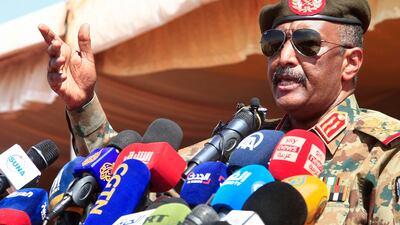Sudan’s military leader has dismissed US threats of sanctions as being of “no use” and renewed assurances that the army will withdraw from politics when the country’s political stakeholders reach consensus or elections are held.
In an hour-long interview aired by state television late on Saturday night, Gen Abdel Fattah Al Burhan also defended contacts with Israel, saying they were part of security co-operation, not held at a high level or of a political nature.
Gen Al Burhan led a coup last October that upended Sudan’s democratic transition, which followed the 2019 removal from power of long-time dictator Omar Al Bashir.
The takeover sparked mass street protests calling for civilian rule and demanding that the military quit politics.
About 80 people have been killed by security forces and 3,000 others injured in the protests since the October 25 coup.
Among Western powers, the US has been the most vocal critic of the military, suspending hundreds of millions of dollars’ worth of aid and threatening to slap sanctions against individuals hampering a return to the democratic transition. Those accused of roles in the killing of protesters have also been threatened with sanctions.
Gen Al Burhan, whose government has been increasingly speaking against foreign “meddling” in Sudan’s domestic affairs, has sounded a defiant note in the face of these threats.
Regrettably, the US is being fed “misleading information received from a party with an interest that conditions before October 25 return,” he said without elaborating. ”Sanctions and threats are of no use and inconsequential.”
Gen Al Burhan also accused UN special envoy to Sudan Volker Perthes of paying too much attention to his bid to get Sudan’s stakeholders to enter a dialogue. The envoy, he said, should instead focus on helping the country prepare for elections promised for next year.
“He has restricted his efforts to the domestic political situation. He does not realise the complexities of Sudan’s situation. He is not required to present an initiative but just facilitate so that all parties sit down together,” he said, signalling a toughening of the military’s position towards the UN initiative.
Gen Al Burhan also repeated his assertion that he had “absolutely” no wish to rule Sudan and that the military will quit politics when an elected government takes office or when a consensus is reached between political stakeholders.
The powerful pro-democracy movement behind the anti-coup protests and the 2018-19 uprising says it will not negotiate with the military. It is calling for Gen Al Burhan and his associates be put on trial on charges of killing protesters and overthrowing a constitutional government.
Al Bashir, ousted by the protest movement and convicted on corruption charges two years ago, is currently on trial, also charged with lethal violence against protesters.
Gen Al Burhan maintains that the killing of protesters is being investigated and said in the interview that members of the police force were detained in connection with the use of live rounds against peaceful protesters.
He gave no details, but the police have repeatedly denied the use of deadly force. Activists blame members of the security and intelligence agencies, which have recently been given wide powers by Al Burhan, for the killings.
Gen Al Burhan said an investigation into the deaths of dozens of protesters when security forces broke up a sit-in protest outside the army headquarters in Khartoum, launched more than two years ago, was continuing.
He said the investigation was being conducted in total transparency, but did not explain why it was taking so long to publish its findings.
The pro-democracy movement claims the probe was derailed by the military when it became clear that senior officers would be incriminated.
“It’s regrettable and saddening for all of us,” said Gen Al Burhan of the killing of the protesters since his October coup.
On relations with Israel, he said Sudan benefited from them and that intelligence sharing between the two countries had led to the capture of extremist cells in Sudan.
He gave no further details, but said Khartoum’s relations with Israel were part of his country’s bid to become part of the international community after years as a pariah state under Al Bashir’s 29-year rule.
Sudan’s military has taken the lead in contacts with Israel, reaching out in late 2020 following an agreement to normalise relations, a move also made by the UAE, Bahrain and Morocco.












